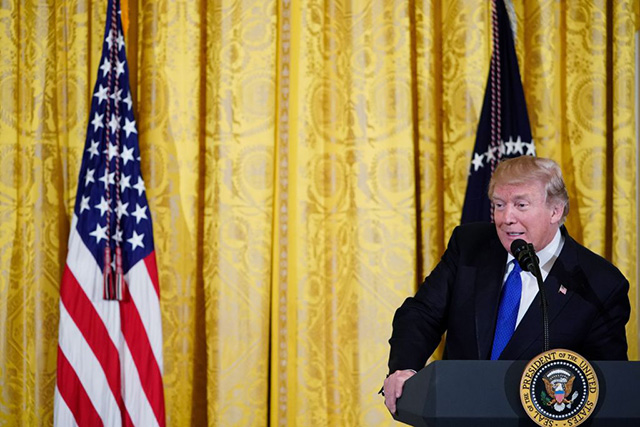
Did you know that Truthout is a nonprofit and independently funded by readers like you? If you value what we do, please support our work with a donation.
Much of the nation’s attention over the last year has fixated on one man: The president of the United States. Will he build his promised border wall? Will he succeed in repealing and replacing Obamacare? Will he try to end Robert Mueller’s investigation into ties between the Trump campaign and Russia? What will he tweet about next?
This fixation on the president — on his campaign promises, his tweets, his executive orders — is understandable. Yet focusing too narrowly on the president threatens to exaggerate the president’s power. In particular, it obscures the fact that the president of the United States is just one actor among many in our governmental system. He is not all-powerful. Indeed, he can do little to change the law without the support or acquiescence of others.
When the framers drafted our Constitution back in 1787, they carefully divided up power to prevent too much authority from falling into any one person’s hands. As a result, at the national level, the Constitution divides power among three branches: the legislative, the executive, and the judicial. In addition, the Constitution imposes separate divisions of power between the states and the national government. It then gives members of the public important protections (such as the right to free speech) against the state governments, the federal government, or both. In other words, to protect against the abuses of power, the Constitution does not concentrate power in one person, in one branch of government, or even in one government.
One consequence of this complicated system of checks and balances is that the president’s power, while vast, is far from unlimited. His ability to get things done depends on many other actors, including Congress, the states, the courts, the media, and members of the public. Take the border wall as an example. Trump repeatedly has insisted that construction should begin. As a legal matter, however, he cannot start this process simply by issuing orders. Rather, the Constitution requires that Congress first allocate the money necessary for such a project. Because Congress so far has refused, the wall remains unbuilt.
By dividing power in this way, the law gives Congress and others, including the people, important mechanisms through which we all can check and balance the president. To the extent that people would like to influence what the president does, or how he does it, there are numerous ways to get involved. In our book, The Limits of Presidential Power: A Citizen’s Guide to the Law, we explore many of the ways that citizens can either work in favor of, or against, a president’s agenda. The following three are often among the most effective:
First, vote in all elections, including state and local elections. Much of what a president wants to get done depends on the support of state and local officials. Federal immigration efforts, for example, rely heavily on choices made at the state and local level. As a result, voting in state and local elections — not only higher profile presidential elections — matters a great deal.
Second, realize that much of a president’s power comes from laws passed by your representatives in Congress, not directly from the US Constitution. To take one important example, the president now enjoys a great deal of discretion in setting climate change policy in our nation. This is not because the Constitution gives him such power. Rather, it is because Congress has — through both its actions and inaction. If it wanted, Congress could take that discretion right back. As a result, citizens who want to support, or to oppose, presidential action in the climate change arena should be exerting pressure on their representatives in Congress.
Third, exercise your First Amendment rights by speaking out on issues you care about. One way you can do this is by going to www.regulations.gov and filing comments in ongoing executive branch rulemaking proceedings that touch on everything from offshore drilling to labor issues, from taxes to gun regulation. The process for filing comments is fairly straightforward, and, by law, agencies must consider all significant comments that they receive.
Regardless of how you choose to participate in our democratic system of government, it is important to remember that the president’s powers are not unlimited. To the contrary, the president is subject to a complex system of checks and balances that is maintained and enforced by others — including people like you.
Trump is silencing political dissent. We appeal for your support.
Progressive nonprofits are the latest target caught in Trump’s crosshairs. With the aim of eliminating political opposition, Trump and his sycophants are working to curb government funding, constrain private foundations, and even cut tax-exempt status from organizations he dislikes.
We’re concerned, because Truthout is not immune to such bad-faith attacks.
We can only resist Trump’s attacks by cultivating a strong base of support. The right-wing mediasphere is funded comfortably by billionaire owners and venture capitalist philanthropists. At Truthout, we have you.
Truthout has launched a fundraiser, and we have only 72 hours left to raise $24,000. Please take a meaningful action in the fight against authoritarianism: make a one-time or monthly donation to Truthout. If you have the means, please dig deep.